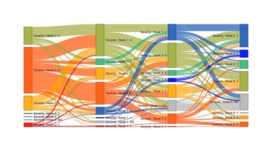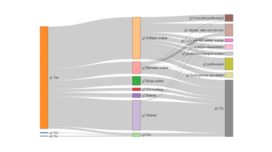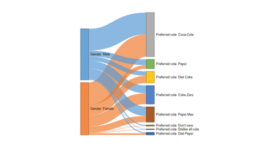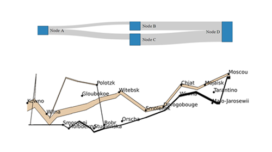The simplest way to create and customize Sankey diagrams
With Sankey diagrams, you can visualize any type of relationship. For even deeper insights, use Sankey diagrams as Predictive Trees or Classification and Regression Trees (CART).
And everything is customizable, including the color plalette, font, hover text, gaps and padding so it's easy to make your Sankey diagram beautiful and branded.
Insightful, interactive, and flexible
Displayr's Sankey diagrams are flexible and can be used even if the variables don't have a one-to-many relationship by setting link colours to variables. Add a filter to make your Sankey charts interactive and even more meaningful. Annotate your Sankey diagram with text boxes, arrows, and shapes to highlight exciting results, and insert background images and text to create a better data story.

Easily publish, embed, or export Sankey diagrams to PowerPoint
With just one click, you can publish your Sankey diagrams as interactive dashboards with filter drop-downs and hovers. Or export to PowerPoint or PDF. And if you need to update or change your data, just switch the data and everything will update automatically on your Sankey diagram.
Don't just stop at Sankey charts, Displayr is the complete tool for all your data analysis, visualization, and reporting.
Make your Sankey diagram in 3 easy steps
Step 1
Sign up to Displayr for free.
Step 2
Follow the prompts to connect, type, or paste in your data and create your Sankey diagram. Here you can easily customize fonts, colors, backgrounds and sizes or do deeper analysis.
Step 3
Publish your Sankey diagram as an interactive dashboard, then export it to PowerPoint or as a PDF with one click.
What is a Sankey diagram?
Sankey diagrams (also known as Sankey plots, Sankey charts, or alluvial diagrams) are an awesome way of visualizing the flow of data, where the width of each flow is based on its quantity.
They are particularly well suited for displaying decision trees, and are often used in the visualization of material flow analysis.
Sankey diagrams assist greatly with locating the most important contributions to a flow. In addition, they frequently depict conserved quantities within defined system boundaries.
In scientific fields such as physics, Sankey diagrams are often used to represent energy inputs, useful output, and wasted output.
Sankey diagrams are made up of three sets of elements: the nodes, the links and the instructions which determine their positions.
Nodes are different groups or variables. For example, if your Sankey diagram represents a person’s monthly budget, the nodes may be the different categories for expenses.
Links are the lines that connect the nodes together, and their size in terms of thickness is determined by the values associated with them.
The instructions determine where the nodes appear in relation to each other. It sounds complicated but is actually pretty simple.
With Displayr’s Sankey diagram generator, your Sankey diagram can range from relatively simple to as complex as you like. You can customize your colors to flow from the first node or the last or by particular variables. In addition, you can change the size of the nodes and labels, and also change the positioning of the nodes and links by manually dragging and dropping.

“Displayr is extremely powerful and extremely intuitive. It can do vastly more analysis more efficiently than any of the tools I’ve tried in the past."
Ron Gailey
President – Americas, Mobile Digital Insights
Don't limit yourself to just Sankey diagrams
Ready to create more stunning visualizations and graphs? There is a whole world out there of awesome ways to visualize your data.
Whether it’s pie charts, box and whisker plots, or streamgraphs, Displayr can help you transform your data into whatever story you want to tell!
And just like Sankey diagrams, you can customize colors, sizes and fonts and have a play with Displayr’s cool features.
Even better, combine different visualizations to create a truly impressive infographic or presentation. What are you waiting for?
Instantly visualize your data
Instantly visualize what you are learning. Displayr is a robust, collaborative data analysis and reporting tool built for humans, not robots. SQL, R, and no-code work together so you can analyze, visualize, and build your report simultaneously in the same app.
Sankey diagram FAQs
When should I use a Sankey diagram?
Sankey diagrams are used to visualize the flow of resources. They portray sources and uses of the resources, materials, or costs represented. They are useful for communicating complex flows visually, with a concentration on a single aspect or resource that you wish to highlight. They are often used in energy management, fields of science, or manufacturing.
How do you read and interpret Sankey diagrams?
To effectively read and interpret a Sankey diagram, please note that the width of the lines and arrows is proportional to the quantity that is represented. This means that their width depicts the amounts or volumes of resources.
What type of data is displayed in a Sankey diagram?
A Sankey diagram is suitable for communicating data from complicated systems. Within a Sankey diagram, data can be analyzed to discover patterns, find bottlenecks, assist with troubleshooting, and help users understand how processes flow.
Why are they called Sankey diagrams?
Sankey diagrams are named after Matthew Henry Phineas Riall Sankey, an Irish-born engineer and captain in the Royal Engineers. In 1898, Sankey first used this type of visualization to show the energy efficiency of a steam engine.
How do I create a Sankey diagram in Displayr?
• Click Visualization
• Select Exotic
• Select the Sankey
• Click Add Data or Drag across your variable from Data Sets
• Click OK
• Customize the Sankey Diagram using the options in the right hand menu
How can I create a Sankey diagram for free with Displayr?
Displayr's Sankey diagram maker is easy to use and visually intuitive. It's built for all skills, levels and all requirements. Start here.






